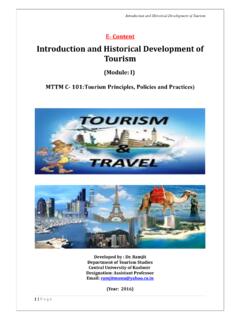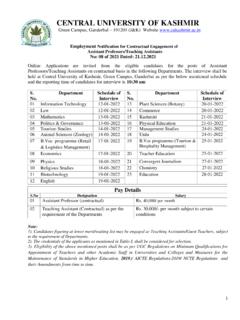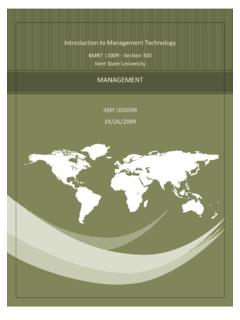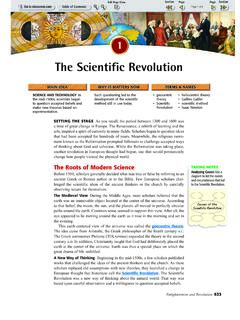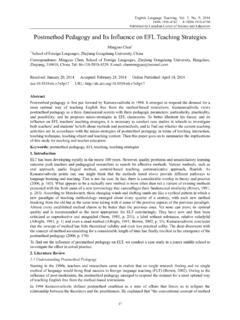Transcription of EDU-C-301: Methodology of Educational Research-I
1 0 MEANING OF RESEARCH Research is a orderly exploratory procedure employed to increase or revise current knowledge by discovering new facts. It is divided into two general categories: a) Basic research is inquiry aimed at increasing scientific knowledge, and b) Applied research is an E-CONTENT Batch- 2016 EDU-C-301: Methodology of Educational Research-I Prepared By Dr. Mohammad Sayid Bhat Assistant Professor, Department of Education, Central University of Kashmir Unit-I: Introduction Research: Meaning and Functions; Scientific Inquiry and Theory Development-Some emerging trends in research; Educational Research: Nature and Scope; Need and Significance; Fundamental and Applied Research; Qualitative and Quantitative Research; Longitudinal and Cross Sectional; Action and Evaluation Research; effort aimed at using basic research for solving problems or developing new processes, products or techniques.
2 Research is a reflective investigation or examination; especially : enquiry or experimentation aimed at the discovery and interpretation of facts, revision of accepted theories or laws in the light of new facts, or practical application of such new or revised theories or laws. CHARACTERISTICS OF RESEARCH 1. Scientific and Empirical: based on observations and experimentation on theories. 2. Systematic: pursues orderly and sequential procedure. 3. Controlled: all variables except those that are tested/experimented upon are kept stable. 4. Employs premise: guides the investigation process. 5. Analytical: There is critical analysis of all data used so that there is no error in their interpretation 6. Objective, Unbiased, & reasonable - all findings are rationally based on experimentation.
3 7. utilizes quantitative or statistical methods: data are translated into algebraic measures and are treated statistically 8. Need expertise: the researcher uses legitimate and cautiously designed measures, valid data gather etc. 9. Must be patient and unhurried activity - to ensure accuracy 10. Involves effort-making capability 11. Needs courage 12. Has sound roots that help to set up evidence or doctrine. 13. Answers all type of questions FUNCTIONS OF RESEARCH 1. It gets the scientific information about all Educational problems. It also helps in attaining specific knowledge about the subjects involved in the study . 2. In action research, the researchers are teachers, curriculum developers, heads, supervisors or others whose main job is to help, provide good learning experiences for pupils.
4 3. In it, a person tries to enable himself to realise his purposes more effectively. For example: A teacher carries out his teaching more efficiently. An administrator, in the education department completes his action to improve his administrative behaviour. 4. Action research is a process which tries to keep problem solving in close contact with actuality at every stage. 5. In Educational system it always strives for the development of the technique of new teachings. 6. It strengthens and highlights the work of the teacher. 7. It has a great usefulness of creating new interest and new self-reliance in the aptitude of the individual teacher. 8. Action research provides sensible usefulness. For class-room teacher, he applies his own observations into his class-room practices to make the observed problems solved.
5 Minor problems in the classroom can be solved by applying the teachers' intelligence. 9. Action research brings modifications in the teachers. It makes them cooperative and vigorous in facing the situation easily. It also brings about changes in the behaviour, attitude and teaching performance. 10. Planning is the chief criterion in Educational research as well action research. To go through the problems much insight is required. For solving all these troubles the teacher goes on reading references, literatures and also research techniques. So academic learning becomes productive when it is practically applied in the proper situation to solve problems in action research. 11. In education system, all types of professional workers are able to solve their practical to improve their own profession.
6 Usually, action research helps the teacher to face day-to-day problems in the classroom. He makes himself psychologically stable and energetic to tackle the situation. He starts his lesson with full ambition and expectation. SCIENTIFIC INQUIRY The scientific inquiry/method is a body of procedures for examining phenomena, obtaining new knowledge, or correcting and integrating previous knowledge. To be termed scientific, a method of inquiry is commonly based on empirical or assessable evidence subject to specific principles of reasoning. The scientific method is an in-progress process, which usually starts with observations about the natural world. Human beings are naturally curious, so they often come up with questions about things they see or hear and often develop ideas (hypotheses) about why things are the way they are.
7 The best hypotheses lead to prophecy that can be tested in various ways, including making further observations about nature. In general, the strongest tests of hypotheses come from carefully controlled and replicated experiments that gather experimental data. Depending on how well the tests match the predictions, the original hypothesis may require modification, adjustment, extension or even refutation. If a particular hypothesis becomes very well supported a general theory may be developed. SCOPE AND FUNCTIONS OF Educational RESEARCH Educational research refers to a systematic effort to gain a better understanding of the Educational system with its process, generally with a view to improving its effectiveness. It is an application of scientific methods to the study of Educational problems.
8 The rationale of Educational research is progress and good life. According to Best, ' Educational Research is that activity which is directed towards development of a science of behaviour in Educational situations. The ultimate aim of such a science is to provide knowledge that will permit the educator to achieve his goals by the most effective methods.' According to Lazarsfeld and Sieber, 'By Educational research is meant here the whole of the efforts carried out by the public or private bodies in order to improve Educational methods and Educational activity in general, whether involving scientific research at a high level or more modest experiments concerning the school system and Educational methods. According to Monroe, 'The final purpose of Educational research is to ascertain principle and develop procedures in the field of education.
9 ' SCOPE The scope of a subject is usually discussed under two heads: Branches, topics and the subject matter it deals with. Limits of its procedures and applications The fields of Educational research is classified here in terms of following content areas: 1. Comparative Education 2. Curriculum construction and Textbooks 3. Economics of Education 4. Educational Administration 5. Educational Measurement and Test development 6. Educational Psychology 7. Educational Technology 8. Guidance and counselling 9. Philosophy of Education 10. Sociology of Education 11. Teacher education and teaching behaviour 1. Educational Psychology Research in Educational Psychology has great importance for a teacher. The expediency of various theories of learning for designing conditions that produce effective learning in school has been the central theme of researches in the recent years.
10 Conditions conductive to efficient learning, factors helpful in promoting memory and concept formation need immediate consideration by the researchers. Promising fields of research in Educational Psychology include: Cognitive, non-cognitive factors such as intelligence, aptitudes, creativity, attitudes, interest, motivation, personality traits, needs and adjustment of pupils, various influences of home, neighbourhood, peer relationships and other social relationships that influences child development, growth and learning are worth investigating. The fundamental process of perception, learning and motivation and their applications, the exceptional children, the adolescent problems, achievement etc. should be also be studied.




